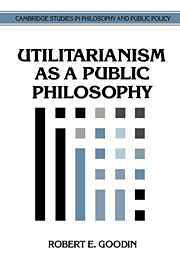Book contents
- Frontmatter
- Contents
- Preface
- Acknowledgments
- PART I INTRODUCTION: MORAL BASES OF STATE ACTION
- PART II MORALITY, PUBLIC AND PRIVATE
- PART III SHAPING PRIVATE CONDUCT
- PART IV SHAPING PUBLIC POLICIES
- 8 Liberalism and the best-judge principle
- 9 Laundering preferences
- 10 Heroic measures and false hopes
- 11 Theories of compensation
- 12 Stabilizing expectations
- 13 Compensation and redistribution
- 14 Basic income
- 15 Relative needs
- 16 What is so special about our fellow countrymen?
- 17 Nuclear disarmament as a moral certainty
- 18 International ethics and the environmental crisis
- References
- Name index
18 - International ethics and the environmental crisis
Published online by Cambridge University Press: 28 January 2010
- Frontmatter
- Contents
- Preface
- Acknowledgments
- PART I INTRODUCTION: MORAL BASES OF STATE ACTION
- PART II MORALITY, PUBLIC AND PRIVATE
- PART III SHAPING PRIVATE CONDUCT
- PART IV SHAPING PUBLIC POLICIES
- 8 Liberalism and the best-judge principle
- 9 Laundering preferences
- 10 Heroic measures and false hopes
- 11 Theories of compensation
- 12 Stabilizing expectations
- 13 Compensation and redistribution
- 14 Basic income
- 15 Relative needs
- 16 What is so special about our fellow countrymen?
- 17 Nuclear disarmament as a moral certainty
- 18 International ethics and the environmental crisis
- References
- Name index
Summary
The problems of the environment have long been seen as global. “Only One Earth” was the motto of the 1972 Stockholm conference founding the United Nations Environmental Program and the title of the book that served as its semiofficial manifesto. Even before that, attention had been firmly fixed on considerations such as the carrying capacity of the planet and the exhaustion of the earth's stock of mineral and other resources.
Still, there is something new and distinctively global about the current concern with the environment. The “first environmental crisis” was essentially a concern with problems that, though recurring the world over, could in principle be resolved perfectly well on a country-by-country basis. When environmental problems were essentially matters of dirty air or water, they were largely matters of domestic political concern. Ill winds and shared waterways apart, pollution generally stayed in the same political jurisdiction as that in which it was generated. Of course, since all industrial nations used broadly the same dirty technologies, they all experienced similar problems of pollution. But problems that were in that sense common among a number of nations were not “shared problems” in a stronger sense, requiring concerted action among all countries for their resolution.
That is not to minimize the seriousness of the problems forming the focus of earlier environmental crusades. London's “killer fogs” were no less lethal for being purely domestic products.
- Type
- Chapter
- Information
- Utilitarianism as a Public Philosophy , pp. 306 - 320Publisher: Cambridge University PressPrint publication year: 1995



